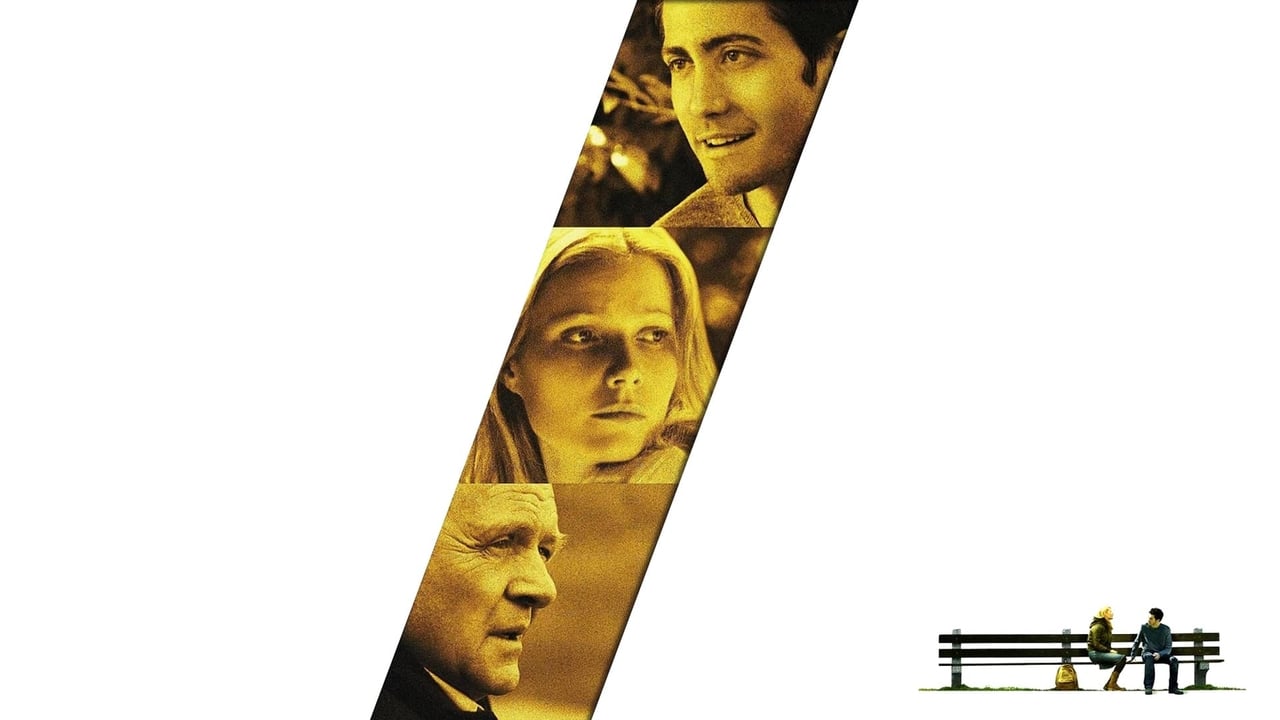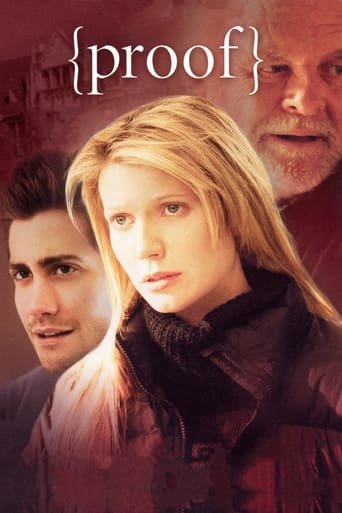Konterr
Brilliant and touching
BoardChiri
Bad Acting and worse Bad Screenplay
ChicDragon
It's a mild crowd pleaser for people who are exhausted by blockbusters.
Catherina
If you're interested in the topic at hand, you should just watch it and judge yourself because the reviews have gone very biased by people that didn't even watch it and just hate (or love) the creator. I liked it, it was well written, narrated, and directed and it was about a topic that interests me.
andy-getsu
Proof is interesting in what it says about genius, my point being not so much about the borders between genius and madness, but about the burdens that genius Lays on those around it, about the how the lives of others are left in the shadows behind the brilliance of a creative genius. Paltrow's Claire is most of the story, as she has been her mad father's caretaker, and has put aside her own ambitions. Now, it emerges that she has accomplished a proof which is a grail or philosopher's stone, which everyone would have expected from her father but not from her. She doesn't straightforwardly present it, and when she identifies it as hers, she immediately gets treated to disbelief and contempt that she has tried to claim this last triumph of her father's fire herself. Her sister sees her father's life and accomplishments as something to be escaped from and does her best to physically drag Claire away from Chicago and father's Hyde Park home, and is incapable of comprehending Claire's desire to remain. Claire however is bound up in the legacy of her father's genius and her proof is certainly a tribute to that, but she feels diminished that because she put aside her own career to care for her father that no one will respect that the proof is her work and not her father's.I suspect that Gwyneth, like Emma Watson as Hermione in Harry Potter, is a lot prettier than the author had in mind for that character, and we may have difficulty feeling the depressed Claire with what a pretty girl we know Gwyneth to be, and at odd moments we realize that we might perceive a scene differently if Gwyneth were not a beautiful woman, but that's not to say fails to play her role brilliantly throughout. I wrote this review after I saw on her IMDb bio: it seems that Pepper Potts, feisty, but still essentially arm candy, from Ironman, is her greatest acting triumph since Shakespeare in Love.On the production side, I'm disappointed to see Proof didn't gross over $8 million, but I can't really imagine how it cost $20 million to make. Most of the story takes place inside a pretty typical Chicago bungalow, and other very ordinary locations. There's no effects. Even if it's hard to imagine it having cost $2o million and you'd like to see Gwyneth Paltrow in a weightier role than as Ironman's arm candy, look in on Proof. This movie deserves more attention.
James Hitchcock
Proof" (2005) is the last in an unofficial trilogy of American films about mathematicians, following on from "Good Will Hunting" (1997), and "A Beautiful Mind" (2001). The central characters are Robert Llewellyn, a distinguished British-born mathematician at the University of Chicago, and his daughter Catherine. Robert is dead when the film opens, but we see him several times in flashback and once as a ghost. We learn that as a young man Robert was regarded as a mathematical genius but suffered from mental illness towards the end of his life. Catherine is, like her father, an academic mathematician. She may have inherited his intellectual gifts, however, but there is also an implication that she may also have inherited his mental instability; certainly her behaviour is often neurotic and irrational. The film revolves around the possibility that, despite his mental problems, Robert might have produced important work during his latter years. He has left a vast quantity of notebooks which Catherine and her boyfriend Hal, a former graduate student of Robert's, assiduously search through. Another important character is Catherine's older sister Claire, an orderly, fussy New York housewife with little interest in mathematics or any intellectual pursuits. The word "Proof" is here used both in its technical mathematical sense and in its everyday sense of "evidence". The crux of the story comes when Hal comes across a notebook containing a mathematical proof which, if valid, would be of immense significance. The question arises of whether this proof is indeed Robert's own work or whether Catherine actually wrote it herself- and if she did, can she prove it? The exact nature of the proof- something to do with prime numbers- is never revealed, but this does not really matter as pure mathematics is not really a subject which can be dramatised on the screen. Gwyneth Paltrow, in Britain at least, has something of the reputation of an eccentric luvvie, with her idiosyncratic language (such as describing her marital break-up as "conscious uncoupling"- or was it "unconscious coupling"), her advocacy of faddish diets and, of course, her special Oscar for Most Emotionally Incontinent Acceptance Speech Ever. Even eccentric luvvies, however, can occasionally rise above their own eccentricity, and while too many of Gwyneth's films have fallen firmly into the "I did it because I needed the money" category, she can occasionally come up with something special, as in "Emma", "Sliding Doors", "Sylvia" and again here. Her Catherine is a strange young woman, but someone we can recognise as human and sympathise with. Coming up with something special is something which Anthony Hopkins does on a regular rather than an occasional basis, and his performance as Robert is well up to his usual high standards. I also liked Jake Gyllenhaal as Hal. The film was based on a theatrical play with only four characters. The director makes some attempt to open the subject up and a few bit-part characters are introduced, but "Proof", dominated more by talk than by action, still betrays its origins on the stage. A film like this, based around a theme which the great majority of the population (myself included) will find very abstruse, could have become intolerably boring; that it does not is largely due to some fine acting. 6/10
RyanCShowers
I almost wish they could re-title "Proof" to "Gwyneth Paltrow's Acting Abilities," because that's what Proof has going for it: Gwyneth Paltrow's tour de force portrayal of a woman caught between the lines of brilliance and insanity. It's the best performance I've ever seen dealing with grief. She has a few times in the first Act she crosses the line and becomes melodramatic, but Act Two and Three prove Paltrow's work to be a hurricane of a performance. I've seen Proof twice, I must say the overall quality of the film dropped the second time around. At times Proof is misdirected and strays into melodrama, therefore loses connection with the viewer. But the director has a handle on many of the painfully emotional scenes. It does display some terrific edited sequences, the performances from Anthony Hopkins and Jake Gyllenhaal are air-tight, and the script is tailored in compelling drama and mystery. Paltrow's emotionally draining performance is reason enough to see it. Rating: 7/10Grade: B+
Desertman84
Proof is a movie that has themes on genius and madness wherein a woman struggles to come to terms with the potentially dangerous legacy of her late father.It stars Gwyneth Paltrow, Anthony Hopkins, Jake Gyllenhaal, and Hope Davis. It was written by Rebecca Miller, which was based on David Auburn's Pulitzer Prize-winning play of the same title. John Madden directed the said feature. Catherine is a woman in her late twenties who is strongly devoted to her father, Robert, a brilliant and well-known mathematician. While Robert's skill in the world of numbers still appears to be strong, his grip on reality begins to slip away, and as he descends into madness, she begins to wonder if she may have inherited her father's mental illness along with his mathematical genius. After his father's passing, she is confronted by Hal, a gifted but zealous student of Robert's who wants to look through the late man's notes in hopes of finding his last great work. While she is hesitant to look too deeply into her father's work for fear of what it might suggest about her own future, she allows him to do so, and when one notebook reveals a mathematical proof of potentially historic proportions, it sets off shock waves in more ways than one.Intense and compelling, it is an absorbing film that shows the intricacies of the human mind are as complex as a mathematical equation. It is an extraordinary play adaptation about matters of scholarship and the heart, about the true authorship of a mathematical proof and the passions that coil around it. The play, with all of its key surprises and biting exchanges intact, is up there on the screen. But given the depth and fascinating pull of Auburn's writing, that's a good thing as themes of trust, the depth of filial responsibility and concerns about genetic inheritances are explored with intelligence.Added to that,it explores issues of love, trust and family wonderfully through the inner life and ironic wit of Catherine.Paltrow and Hopkins give exceptional performances in a film that intelligently tackles the territory between madness and genius. Davis and Gyllenhaal complete a dream cast. Overall,Proof now joins 1984's Amadeus, 1985's made-for-television version of Death of a Salesman and 1988's Dangerous Liaisons on the list of the best modern movie adaptations in recent years.

